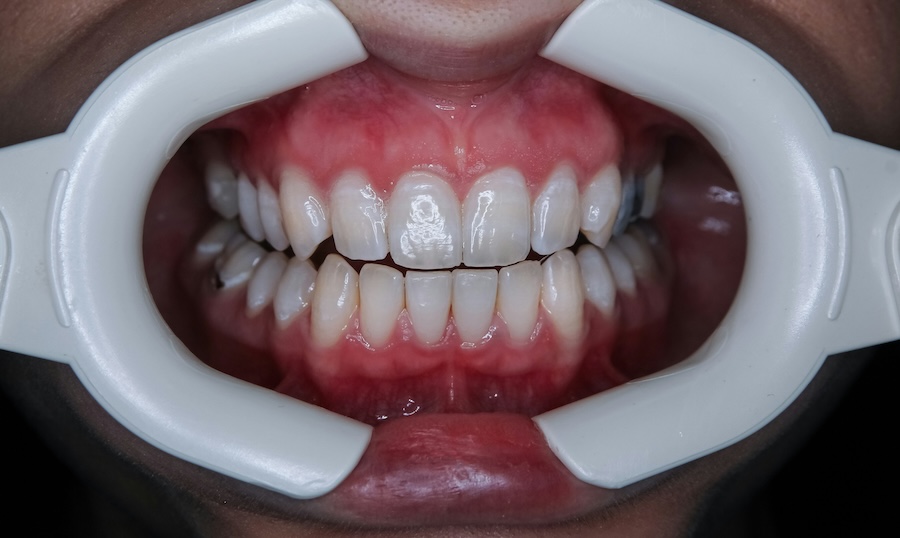Why Are My Gums Swollen? Six Possible Reasons and What to Do

Swollen gums can be uncomfortable, unsightly, and sometimes alarming. While this is a common dental issue, understanding its cause is essential for proper care. Often, gum swelling is temporary and resolves with improved oral hygiene. However, persistent or severe swelling may hint at underlying dental problems that need professional attention.
This guide explores six possible reasons why your gums may be swollen and provides actionable steps to address them.
1. Underlying Health Conditions (Like Diabetes)
Certain medical conditions, especially those that impact your immune system or circulation, can make you more susceptible to gum inflammation. Diabetes, for example, increases the risk of gum disease due to poor blood sugar control, which weakens your body’s ability to fight off infection and slows healing. Other conditions such as autoimmune disorders, leukemia, or HIV/AIDS may also present symptoms like swollen or bleeding gums.
Symptoms Related to Medical Conditions
- Swollen, tender gums
- Slow healing of oral sores
- Frequent gum infections or bleeding
What to Do
If you have a chronic health condition, gum swelling may be a sign that it’s not well-managed. Here’s what you can do:
- Talk to both your doctor and dentist about your symptoms.
- Keep chronic conditions like diabetes under control with proper medication and lifestyle habits.
- Maintain a diligent oral hygiene routine and schedule regular dental cleanings.
Coordinated care between your dental and medical providers is key to protecting your overall health.
2. Periodontitis
If left untreated, gingivitis can progress into periodontitis, a more serious form of gum disease. At this stage, inflammation penetrates deeper, potentially damaging the gums and underlying bone supporting your teeth.
Symptoms of Periodontitis
- Receding gums
- Persistent gum swelling
- Loose teeth or gaps forming between teeth
- Chronic bad breath (halitosis)
What to Do
If you suspect periodontitis, it’s crucial to visit a dentist immediately. They may perform a deep cleaning (scaling and root planing) to remove bacteria below the gumline. Severe cases may require surgical interventions, such as flap surgery or bone and tissue grafts.
3. Poor Oral Hygiene Habits
Ignoring daily oral hygiene can quickly lead to swollen gums. Without regular brushing and flossing, food debris, plaque, and bacteria collect around the gumline, causing irritation and inflammation.
Symptoms of Poor Oral Hygiene
- Visible plaque buildup
- Bad breath
- Sensitivity or discomfort when eating
What to Do
Improving your oral hygiene routine can resolve swelling caused by neglect:
- Brush for at least two minutes, twice a day.
- Use interdental brushes or floss daily to clean between teeth.
- Schedule a dental cleaning to reset your oral health baseline.
Consistency is key for maintaining healthy gums and preventing further problems.
4. Hormonal Changes
Did you know that hormonal fluctuations can make gums more sensitive and prone to swelling? Pregnancy, puberty, menstruation, and menopause can all increase blood flow to the gums, leading to irritation even with good oral hygiene.
Symptoms of Hormonal Swelling
- Swollen, tender gums
- Gums that appear darker or redder than usual
What to Do
Continue practicing meticulous oral hygiene, and visit your dentist if symptoms persist. Dentists often recommend more frequent cleanings during pregnancy or other hormonal phases to keep gums healthy.
5. Nutritional Deficiencies
A diet lacking essential nutrients, particularly vitamin C, can affect gum health. Vitamin C deficiency (scurvy) is rare but can lead to swollen and bleeding gums. Other nutrient shortages, like those of vitamin D or iron, can also weaken gum tissue.
Symptoms of Nutritional Deficiencies
- Swollen, bleeding gums
- Fatigue and overall weakness
- Slow wound healing
What to Do
- Include vitamin-rich foods in your diet, such as oranges, spinach, and nuts.
- Consider supplements with your doctor’s approval.
- Consult both a dentist and healthcare provider to rule out other underlying health issues.
6. Ill-Fitting Dental Appliances
Braces, dentures, and retainers that don’t fit well can create constant friction or pressure on the gums, leading to irritation. Over time, this irritation can cause localized swelling and soreness.
Symptoms of Ill-Fitting Dental Appliances
- Swelling or soreness around the appliance
- Difficulty chewing or speaking due to discomfort
- Red or irritated patches on the gums
What to Do
- Visit your dentist or orthodontist to adjust the fit of your appliance.
- Avoid attempting DIY fixes, as this can worsen the issue.
- Use orthodontic wax to reduce friction while awaiting professional adjustments.
When to See a Dentist
While some gum swelling resolves with improved oral care, there are instances when you should consult a professional:
- Swelling lasts more than a few days.
- You experience severe pain or notice pus around the gums.
- Loose teeth, gum recession, or severe bleeding occurs.
The general rule? It’s always better to be safe than sorry when it comes to your dental health.
How Smart Dental Network Can Help
At Smart Dental Network, we recognize the vital role healthy gums play in your overall health. That’s why we offer a comprehensive range of personalized services, from professional cleanings and gum disease treatment to advanced cosmetic procedures. Our skilled team of dentists and hygienists is committed to delivering exceptional care to keep your gums healthy and your smile confident. Discover top-quality dental care near you here.
